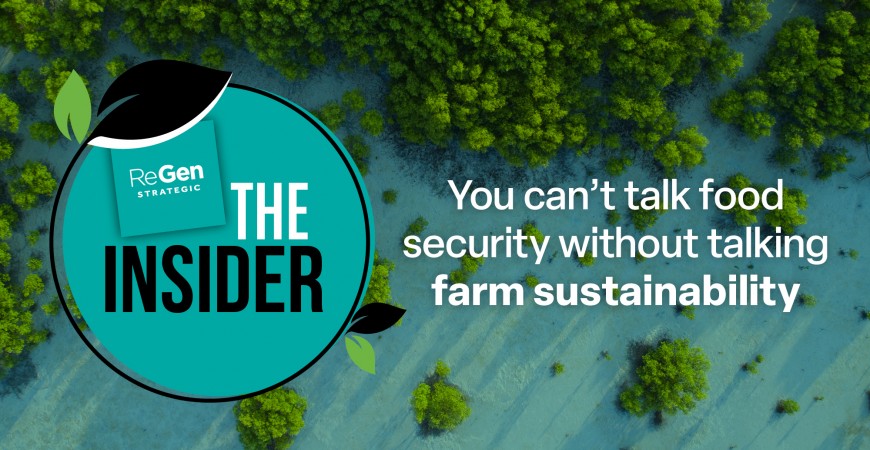In recent years, the phrase “food security” has been widely used across agricultural conferences, government policy papers, and media headlines - particularly in the face of supply chain disruptions, extreme weather events, and global instability. But too often, the conversation around food security focuses solely on yield, efficiency, and logistics, while ignoring the foundational requirement for truly secure food systems: sustainability.
If we are serious about securing Australia's food future, particularly here in Western Australia, where agricultural production underpins regional economies then we must address sustainability not as a marketing trend or regulatory box-tick, but as a core operating principle. For farming to remain viable, resilient, and socially supported, sustainability must be embedded into the way we assess, plan, operate, and communicate our agricultural systems.
It’s essential to acknowledge that sustainability is not a new or external concept for farmers. Stewardship of the land has been at the heart of farming for generations - sustainability is quite literally ingrained in their way of life. For hundreds of years, farmers have prioritised the long-term health of their soils, water resources, and ecosystems, understanding that the future productivity of their farms depends on it. What’s changed is the scale and sophistication of farming operations, alongside evolving environmental, social, and market expectations. This means we need more advanced approaches to setting, managing, and reporting on sustainability outcomes - building on a foundation that farmers have long upheld.
Agricultural Sustainability is Structural, Not Superficial
Sustainability in agriculture has historically been conflated with optional, high-level sustainability goals - or worse, dismissed as a burden imposed by distant regulators or urban stakeholders who "don’t understand farming". But in reality, sustainability is about managing the material risks that, left unaddressed, can directly threaten the productivity, profitability, and longevity of farming enterprises.
For instance, declining soil health, insecure water access, biodiversity loss, rising energy costs, and community resistance are not theoretical challenges. They are current constraints in many WA farming regions and their severity is increasing. Sustainability assessments that are science-based, site-specific, and economically grounded help farmers address these risks before they become existential.
Furthermore, sustainability is now critical for market access. Major processors, retailers, and international buyers are implementing supplier requirements based on sustainability performance. These may include metrics on emissions, animal welfare, water use efficiency, or labour conditions. Farms that cannot provide credible, traceable data on these factors may soon find themselves excluded from key supply chains.
From Environmental Management to Resilience Planning
The agricultural sector has always engaged in forms of environmental management whether through nutrient planning, erosion control, or animal health protocols. However, traditional compliance approaches are often reactive and narrow in scope. Today’s sustainability imperatives demand a broader, integrated approach; one that considers cumulative impacts, long-term viability, and stakeholder expectations.
For example, effluent management is no longer just about complying with discharge limits; it now intersects with greenhouse gas emissions (methane and nitrous oxide), odour complaints, biosecurity concerns, and in some regions, groundwater contamination risks. A sustainability-focused approach doesn’t just aim to stay within regulatory thresholds, it asks how those systems can be optimised for operational efficiency, environmental stewardship, and social licence.
Importantly, the conversation is no longer just about the physical environment. Social sustainability including worker conditions, community engagement, Traditional Owner relationships, and regional economic contribution is now a core component of sustainability reporting and risk management frameworks. A farm that fails to engage its community may find expansion plans blocked, approvals delayed, or its brand undermined by activist campaigns or local opposition.
Materiality is Key to Getting it Right
One of the challenges is the sheer volume of issues that fall under the sustainability umbrella. From carbon emissions and water stewardship to biodiversity, animal welfare, and social impact, it's easy to become overwhelmed or to focus on the wrong priorities.
This is where a materiality assessment becomes essential. Materiality assessments identify the most significant environmental, social, and governance topics both from a business impact and stakeholder perspective. In farming, this might include things like groundwater use, nutrient runoff, biosecurity risk, or community odour sensitivity. By focusing resources on what actually matters, producers can avoid the inefficiency (and ineffectiveness) of broad, generic sustainability initiatives.
A well-executed materiality process should be evidence-based, engage key internal and external stakeholders, and align with recognised sustainability standards. It also provides the foundation for transparent and credible sustainability reporting which, increasingly, is expected not only by regulators but by the broader market and community.
The Path Forward: Practical, Scalable Sustainability
The good news is that sustainability in farming doesn’t have to mean overhauling systems or investing in expensive technologies. It can start with simple, science-based improvements: optimising nutrient management, improving staff engagement, strengthening community relationships, or developing clear policies and baselines for key risks.
Sustainability frameworks should be practical, farm-scale appropriate, and focused on value creation, not just risk avoidance. For intensive operations, this might mean better data tracking and reporting. For mixed farms, it could involve biodiversity mapping or improved chemical handling protocols. What matters is that sustainability becomes embedded in decision-making not added as an afterthought.
At ReGen, we are working with farming clients across Western Australia to integrate sustainability into their operations in ways that are proportionate, rigorous, and achievable.
To continue feeding a growing population in a changing climate, Australia’s farming systems must be robust, adaptive, and trusted. That means addressing not just how much we produce, but how we produce it and what legacy we leave behind.
Food security without sustainability is an illusion. It is only through forward-thinking, evidence-based, and socially conscious farming practices that we can truly secure the future of agriculture for producers, consumers, and the communities in between.
 ReGen Strategic
ReGen Strategic